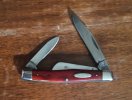- Joined
- Sep 30, 2014
- Messages
- 596
My father passed down a couple knives to me that were previously my grandfathers. He passed away almost 15 years ago and I have no idea how old these knives are. Sadly, they are in really rough shape. They are tarnished, rusted, hard to open, etc.
I can tell they were heavily used and oh boy the stories these blades would tell if they could speak. He was a farmer so I can only imagine what they’ve seen.
Any tips/advice on how to restore these? I’d like to try and do it myself but I would even pay someone if there are people that do this sort of thing. I think it would be incredible to carry these on special occasions. I would love to show my father and grandmother these knives once they are cleaned up.
Biggest issue is the rust. But also the actions on both or very stiff and hard to open.
These are the only traditional knives I own so my knowledge is limited.
Any advice is welcome!
Mods sorry if this isn’t the right spot for this thread. Please move it if I put it in the wrong spot.
https://flic.kr/p/21SzLjc
https://flic.kr/p/21SzLj2
https://flic.kr/p/21MBjBS
I can tell they were heavily used and oh boy the stories these blades would tell if they could speak. He was a farmer so I can only imagine what they’ve seen.
Any tips/advice on how to restore these? I’d like to try and do it myself but I would even pay someone if there are people that do this sort of thing. I think it would be incredible to carry these on special occasions. I would love to show my father and grandmother these knives once they are cleaned up.
Biggest issue is the rust. But also the actions on both or very stiff and hard to open.
These are the only traditional knives I own so my knowledge is limited.
Any advice is welcome!
Mods sorry if this isn’t the right spot for this thread. Please move it if I put it in the wrong spot.
https://flic.kr/p/21SzLjc
https://flic.kr/p/21SzLj2
https://flic.kr/p/21MBjBS


